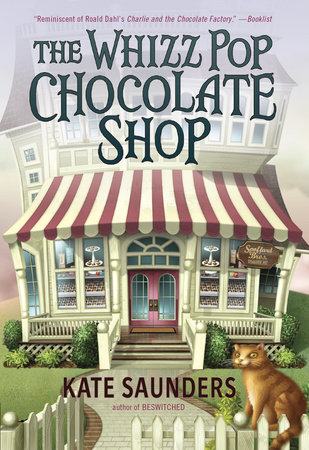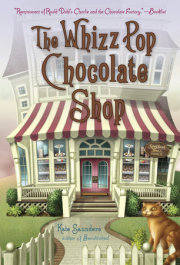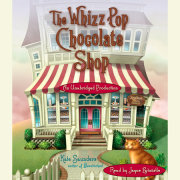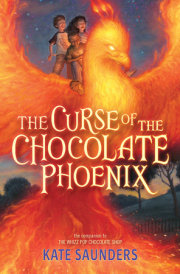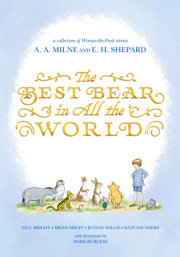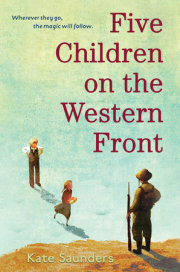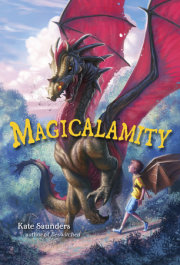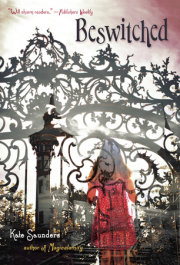"We'll probably sell the place," Dad said, from the driver's seat. "I shouldn't think it's worth much. The letter said it had been empty for more than seventy years."
"It's probably a rat-infested ruin," said Oz.
"Rats!" squeaked Lily. "I hate rats!"
"Keep your wig on, Lil," Dad said over his shoulder. "We're only taking one quick look. I've never inherited a house before."
The previous day, a strange parcel had arrived at the Spoffard family's small house in Washford Common. It was from a solicitor named Mr. Spike. In his letter, he explained that Dad's great-uncle Pierre had died and left him a house. The parcel had also contained a set of old keys and the title deeds to 18 Skittle Street, London N7.
At first Bruce Spoffard had thought it must be a mistake. As far as he knew, his great-uncle Pierre had been dead since long before he was born. "The three Spoffard brothers--my great-grandfather and two great-uncles--were killed in a freak accident in 1938, when the tram they were in ran off the Thames Embankment."
"Pierre obviously didn't die on that tram," said Oz. "I bet he deliberately faked his own death. Maybe his brothers did too."
"Steady on," Dad said, smiling. "Even if they did, they wouldn't have lasted until now--they'd be about a hundred and twenty!"
"I'm sure there's a perfectly simple explanation," Mum said. "Whatever it is, this house couldn't have come along at a better time--what with the mortgage and the twins' shoes, and Oz's music lessons and Lily's tutor, and a new baby on the way."
"I don't want a tutor," said Lily. "Sandra's a cow--she blames me when I can't do things."
Her parents had heard this complaint many times before, and now ignored it. They had an amazing talent for not hearing things they didn't like.
"And this old car's on the point of conking out," Dad added.
"It's a shame you had such expensive kids," Lily said crossly. "Oz costs a lot because he's a genius, and I do because I'm stupid."
"For the last time," Mum said, studying the street map, "you are not stupid. You have dyslexia."
"I'm not a genius, either," said Oz. "If I were a genius I wouldn't need music lessons, would I?"
Neither parent was really listening. "Where are we, anyway?" Mum asked. "I don't know this part of London at all."
"We're just coming into Holloway," Dad said. "Not long now."
Bruce Spoffard was a tall, bony man with curly black hair cut very short around his bald patch and a kindly, rather sleepy-looking face. His wife, Emily, was a small, pale person with straight blond hair and a sweet, faraway smile. Their eleven-year-old twins, Oz (short for Oscar) and Lily, were an interesting mixture of them both. Oz had straight light-brown hair and greenish-blue eyes. Lily had crazy curly black hair, a pale face dotted with freckles and eyes like black buttons.
Lily stared out of the window. Despite the bright sunshine, this section of London was gray and dreary, a hot mess of noisy roads and run-down shops. Washford Common had trees and gardens; here she couldn't see a single leaf or blade of grass.
"Here we are--this is Skittle Street."
Dad turned the car onto a short street with a large block of flats down all one side. On the other side was a row of sooty, shabby Victorian shops. In silence, they all got out of the car and stared at the shops.
Oz's interest quickened. He hadn't cared that much about seeing the new house, but he thought there was something quite intriguing about this street.
The shop at the end of the row was boarded up and covered with graffiti. But the supermarket next door had a colorful display of fruit and vegetables spilling out onto the pavement, and window boxes of scarlet geraniums on the upstairs sills. The hardware shop next to it had bouquets of rainbow-colored feather dusters hanging in the doorway. Next to this was a very cheerful-looking cafe, its steamy windows filled with pictures advertising all-day breakfasts.
Across the road, a black boy of about Oz's age was skateboarding on the concrete ramp that led down to the dustbins. Every time he got to the bottom of the ramp he did a showy corkscrew twist--the kind Oz could never do himself without falling off. He thought how brilliant it would be to have a friend like this boy, though he was probably too cool to be friends with a violin-playing nerd like Oz. The boys in his class mostly treated him as if he were invisible.
"Well, this is my new house," Dad said, in front of the boarded-up shop.
Under the crust of dirt, you could just make out the curly letters above the door.
Lily nudged Oz. "What does that say?"
"Spoffard Bros.," Oz read to her (Lily's dyslexia made reading difficult, especially when the letters had funny shapes). "Established 1927--hey, Dad, this was your family business!"
"Yes," Dad said, "and I can remember my grandmother telling me about it when I was little. You know the story. They were makers of fine chocolate. They had a showroom in Piccadilly, but this was their workshop, and Great-Uncle Pierre lived upstairs." He began to search through the bunch of keys. "I assumed it had been sold years ago; funny that it's been here all this time, empty."
"Should we risk going inside?" Mum wondered. "It might not be safe."
Something soft brushed Lily's foot. It was a cat-a rather stout but very beautiful female cat, with long golden-brown fur and bright, solemn green eyes of a peculiar square shape. She sat down on the pavement and stared at Lily.
"Hello," whispered Lily. She longed for a cat and had asked for one for their eleventh birthday two months ago, but her parents had said that cats and new babies didn't mix. She bent down to stroke the cat's soft, smooth head.
"Lily," Mum said, "what on earth are you doing?"
"Look--isn't this cat adorable?"
"Darling, what are you burbling about now?"
"I'm not burbling!" Lily looked down at the cat. She had gone. There was no sign of her.
"Oz, you saw that cat, didn't you?"
"No." Oz had been watching the skateboarding boy.
"She must've run away when she sensed hostility."
Mum groaned. "Please let's not have the cat argument now."
"Found it!" cried Dad. He unlocked the front door, cautiously pushing it open. It opened onto a dark passage with a door at the other end and another door in the left-hand wall.
Copyright © 2013 by Kate Saunders. All rights reserved. No part of this excerpt may be reproduced or reprinted without permission in writing from the publisher.

